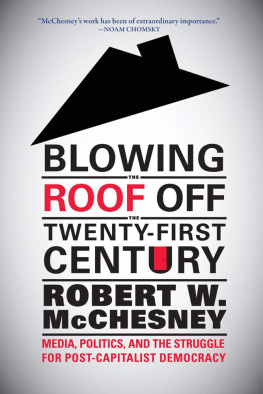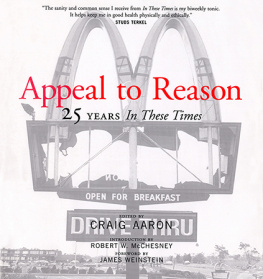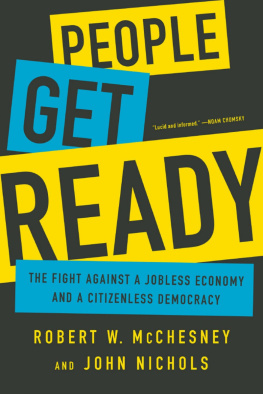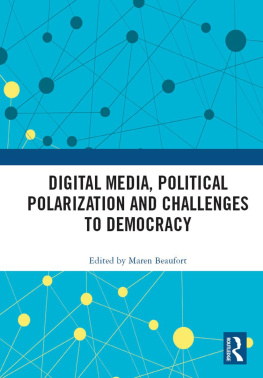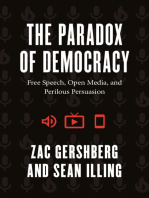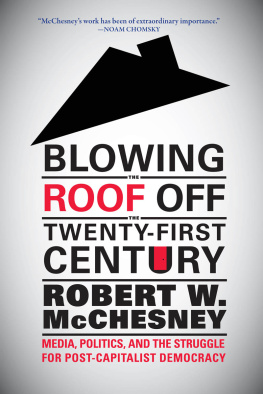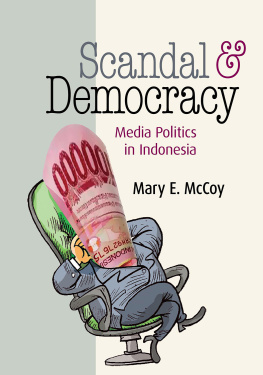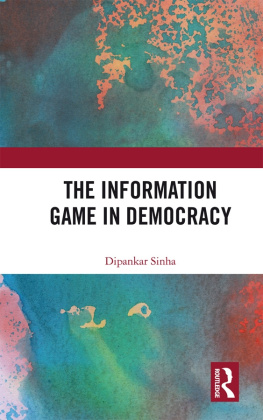Praise for Rich Media, Poor Democracy
If Thomas Paine were around, he would have written this book. If Paul Revere were here, he would spread the word. Thank God we have in Robert McChesney their equal in his love of liberty and his passion to reclaim it from the media giants who treat the conversation of democracy as their private property.Bill Moyers
McChesneys rich and penetrating study advances considerably his pioneering work on media and democracy.... [A] very significant contribution.
Noam Chomsky
Rich Media, Poor Democracy will reconfirm Robert McChesneys growing reputation as the greatest of our media historians.
Mark Crispin Miller, author of Boxed In: The Culture of TV
For those concerned with the future of our democracy, and the conditions for that democracycitizen participation and informed public discourseBob McChesneys book will be of great interest. A sophisticated and provocative analysis of the troubling oligopolistic trends sweeping through our media system and so much of our economy today.
U.S. Senator Paul Wellstone
A deep and richly textured examination of the developing worldwide corporate media environment and its impact on public life. This book should provoke the vigorous, informed debate that is needed if the needs of citizenship are to survive the new media atmosphere.
Bill Kovach, Niemann Fellow, Harvard University
A tour de force.... McChesney offers convincing evidence that commercial media have no incentive to promote civic discourse or to serve the public good.Lance Bennett, author of News: The Politics of Illusion
Robert McChesney is one of the nations most important analysts of the media and his new book is a vital contribution to our understanding of what is happening today.
Howard Zinn, author of Declarations of Independence: Cross-Examining American Ideology
With Rich Media, Poor Democracy anyone can become an expert on our profit-driven, celebrity-obsessed, schlock-soaked media and what needs to be done to repair them. Its a rare book that combines such a wealth of data with such fearlessly sweeping analytical thinking.
Barbara Ehrenreich, author of Fear of Falling: The Inner Life of the Middle Class
Robert W. McChesney is the Gutgsell Endowed Professor in the Department of Communication at the University of Illinois at Urbana-Champaign. He is the author, most recently, of Digital Disconnect (The New Press) and a co-author, with John Nichols, of Tragedy and Farce (The New Press) and the award-winning Dollarocracy. He lives in Champaign, Illinois, and Madison, Wisconsin.

1999 by the Board of Trustees of the University of Illinois
Preface to the 2000 edition 2000 by Robert W. McChesney
Preface to the 2015 edition 2015 by Robert W. McChesney
All rights reserved.
No part of this book may be reproduced, in any form, without written permission from the publisher.
Requests for permission to reproduce selections from this book should be mailed to: Permissions Department, The New Press, 120 Wall Street, 31st floor, New York, NY 10005.
Originally published in hardcover by the University of Illinois Press, Champaign, 1999
First published in paperback by The New Press, New York, 2000
This edition published by The New Press, 2015
Distributed by Perseus Distribution
ISBN 978-1-62097-070-6 (e-book)
The Library of Congress has catalogued the hardcover as follows:
McChesney, Robert Waterman, 1952
Rich media, poor democracy: communication politics in dubious times / Robert W. McChesney
p. cm.(The history of communication)
Includes bibliographical references and index.
1. Mass mediaPolitical aspectsUnited States. 2. Mass mediaUnited StatesOwnership. 3. DemocracyUnited States. I. Title. II. Series.
P95.82.U6M38 1999
302.23'0973dc21 98-58055
The New Press publishes books that promote and enrich public discussion and understanding of the issues vital to our democracy and to a more equitable world. These books are made possible by the enthusiasm of our readers; the support of a committed group of donors, large and small; the collaboration of our many partners in the independent media and the not-for-profit sector; booksellers, who often hand-sell New Press books; librarians; and above all by our authors.
www.thenewpress.com
Set in 11.3/14 Monotype Garamond with Officina Bold and Polyoptix Two display Book design by Rich Hendel
Printed in the United States of America
10 9 8 7 6 5 4 3 2 1
For Inger, Amy, and Lucy
O let America be America again
The land that never has been yet
And yet must be
Langston Hughes
CONTENTS
This book is about the media crisis in the United States (and world) today and what we should do about it. The main point underlying the book is the contradiction between a for-profit, highly concentrated, advertising-saturated, corporate media system and the communication requirements of a democratic society. I elaborate upon this theme in a number of ways. I discuss, for example: the decline of journalism and the hypercommercialization of culture; the antidemocratic manner by which communication policy making has been and is being conducted in the United States; the close relationship of the media system to the broader (globalizing and neoliberal) capitalist economy with its dilapidated political culture; and the way that the Internet is being incorporated into the heart of the corporate communication system, decidedly undermining the democratic potential envisioned by its founders. I also develop two related themes: the use of mythology, particularly the myth of the free market, to defend this unaccountable private control over communication, and the spurious use of history by proponents of the corporate media status quo, particularly with regard to the origins of commercial broadcasting and the nature of the First Amendment to the U.S. Constitution.
I argue in this book that if we are serious about democracy, we will need to reform the media system structurally. The evidence points inexorably to this conclusion. In my view this reform will have to be part of a broader movement to democratize all the core institutions of society. Indeed, for the past several years I have been involved with a number of media reform efforts as well as broader political campaigns in the United States, and these experiences inform my analysis, particularly in the conclusion. This is a book, then, written both for citizens and for scholars. While the focus of this book is on organizing politically for media reform, there also is an implicit message to academic communication scholars: what we do is important and can be of crucial value to efforts to democratize communication. Sadly, I believe too much of U.S. communication research and education has dropped the ball in this regard. This is a point I have written about in several essays in the 1990s and that I intend to return to in the future.
The University of Illinois Press was my first and only choice to publish this book. I have co-edited a history of communication series for the Press since 1994 and have been pleased beyond words with the open-mindedness, professionalism, and commitment to quality of the entire operation. Karen Hewitt has overseen the editing and handling of the book since we first talked about it in 1997, and she has been absolutely terrific in her role as editor. I would also like to thank Patricia Hollahan for copyediting, Christina Dengate for proofreading, and Margie Towery for indexing.
Next page

